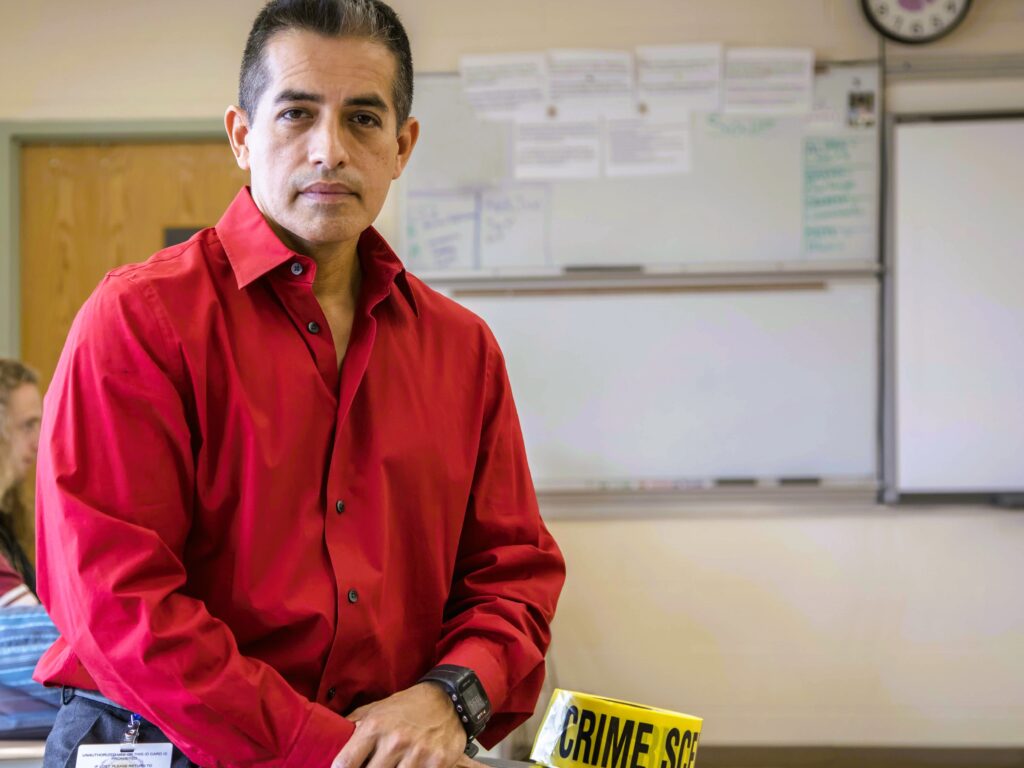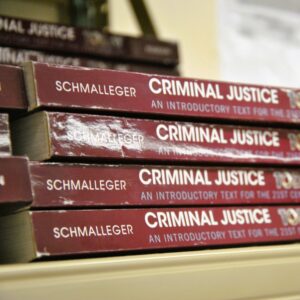Portrait of a Graduate in Action: Criminal Justice Program
The Criminal Justice (CJ) program at Warwick Valley is one of the district’s selection of Career & Technical Education (CTE) programs offered in-house at Warwick Valley High School. The CJ program helps students develop the technical and soft skills demanded by the criminal justice field, and which are applicable in a wide array of career and collegiate pathways. In this way, the program closely reflects Warwick Valley’s Portrait of a Graduate.
Portrait of a Graduate lays out the district’s aspiration and intention that every Warwick graduate embody these seven qualities:
- Collaboration
- Communication
- Creativity
- Ethical & Global Citizenship
- Resilience
- Problem Solving
- Lifelong Learning

WVHS Criminal Justice teacher Eduardo Avila
“When [the class] is doing incident actions, there’s a name for the person’s role who speaks for the group,” explained criminal justice teacher Eduardo Avila. As part of their education, the students in his two-year CJ class provide event security and assistance for events around the district and in the community. “The person who keeps all of the other involved parties informed; that’s actually called Communications!”
CJ student Nico Carrillo explained that being able to communicate with every person at an emergency site, from those affected by it to those responding to it, is critical.
“We definitely learn about good communication in this class,” Nico said. “You have to know what questions to ask. You have to be able to get as much detail from everyone as possible.”
Classmate Alina Bartsch agreed, and added that specificity can be particularly critical to organization and execution at emergency or event site.
“For example, a lot depends on the event and where it is,” said Alina. “If we’re going off school campus, we have to figure out the exact address. Then, we have to create maps of the [event] site so we have maps to provide.”
 Taking the CJ program is a two-year commitment that is available to students during their junior and senior years. In year one, the course provides a comprehensive exploration of the American criminal justice system, with a multifaceted curriculum that covers the police, the court system, corrections, and incorporates hands-on experiences like labs, fingerprinting, ballistics, and police defensive tactics.
Taking the CJ program is a two-year commitment that is available to students during their junior and senior years. In year one, the course provides a comprehensive exploration of the American criminal justice system, with a multifaceted curriculum that covers the police, the court system, corrections, and incorporates hands-on experiences like labs, fingerprinting, ballistics, and police defensive tactics.
The program takes an even more practical turn in year two, incorporating on-the-job learning with local law enforcement, hands-on experiences that provide students to apply their knowledge in real-world settings. This reinforces the district’s goal of helping students be strong problem solvers who are resilient in the face of challenges.
“Sometimes, people can give us a hard time at events,” said Nico. “There can be a lot of arguing; people talking at the same time. We need to be able to figure out situations like that. We have to figure out how to deal with people who are, maybe, overly emotional.”
CJ students learn right away that roles in criminal justice demand someone be adept at working with others. Mr. Avila explained that how you work with others, how well you are able to build networks, all figures into how effective someone can be at creating plans and resolving situations.

Criminal Justice program student Kira Ferrier
“We’re all pretty much working together on literally everything in this class,” said student Kira Ferrier. Kira has more to share about the CJ program in her recent Superintendent’s Spotlight feature.
Each day the class meets, it meets for three full periods in the afternoon. That means plenty of time for CJ students to engage in group activities, labs, and career explorations that align with the district’s emphasis on producing effective collaborators. The program also sews the seeds of lifelong learning, as students are encouraged to embrace learning beyond the classroom.
“And, these are all universal skills that they’re going to take out of here,” said Mr. Avila, who has seen CJ students take many different career and collegiate pathways out of the CJ program. “Some go into security, or even do security as a side gig while they’re in college. I’ve had students go into law enforcement, others into private security. Some continue on to get their degrees in criminal justice.”
Mr. Avila mentioned one former student who provides private security at Good Samaritan Hospital, and another who is currently studying at the Forensic Anthropology Center at the University of Tennessee College of Arts & Sciences. She’s continued her hands-on learning at a facility known as the “Body Farm.”
“She wants to go into forensic anthropology,” Mr. Avila beamed proudly. He added that even before career or college choices are made, it’s often clear that “most of my students just want to be a part of something good. Whether that means law enforcement or going into social justice; they just want to make a difference for people.”
Portrait of a Graduate is not merely a conceptual framework for the district, but an integral part of the school culture; the CJ program reflects that set of district values perfectly. Each course contributes to the development of well-rounded individuals who possess the skills and attributes to thrive and feel fulfilled in their post-graduation world.
“That’s the skill set you develop here,” said Mr. Avila. “That foundation outlined by the Portrait of a Graduate; it’s a skill set to make you successful wherever you go!”

